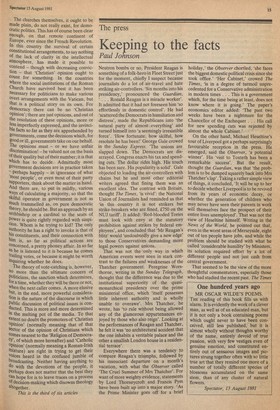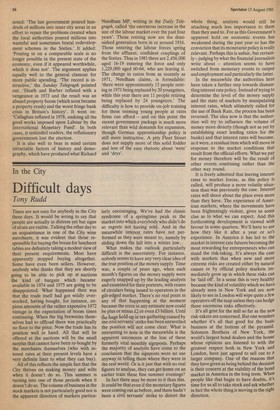The press
Keeping to the facts
Paul Johnson
Neutron bombs or no, President Reagan is something of a folk-hero in Fleet Street just for the moment, chiefly I suspect because journalists do a lot of air-travel and hate striking air-controllers. 'Six months into his presidency,' pronounced the Guardian, . . . Ronald Reagan is a miracle worker'. It admitted that it had not foreseen him `so effortlessly in domestic control'. He had 'scattered the Democrats in humiliation and distress', made the Republicans into 'the natural party of almost everything' and turned himself into 'a seemingly irresistible force'. 'How fortunate, how skilful, how resolute he has been!' George Gale crowed in the Sunday Express. The unions are slapped down. The Democrats are disarrayed. Congress enacts his tax and spending cuts. The dollar rides high. His touch has been sure. His popularity is solid'. Gale objected to loading the air-controllers with chains but he and most other editorial writers agreed that fining them was an excellent idea. The contrast with Britain, thought The Times, Is vivid': the National Union of Journalists had reminded us that 'in this country it is not strikers but strike-breakers who are fined, £750 on the NUJ tariff'. It added: 'Red-blooded Tories must look with envy at the statutory prohibition against strikes by federal employees', and concluded that `Mr Reagan's blitz' would 'undoubtedly give a new edge' to those Conservatives demanding more legal powers against unions.
That was not the only way in which American events were seen in stark contrast to the failures and weaknesses of the Thatcher government. Peregrine Worsthorne, writing in the Sunday Telegraph, thought that the difference was due to the institutional superiority of the quasimonarchical presidency over the prime ministerial office, which 'itself possesses little inherent authority and is wholly unable to overawe'. Mrs Thatcher, he wrote, has `to rule without being allowed any of the glamorous appurtenances enjoyed by those who also reign'. Looking at the performances of Reagan and Thatcher, he felt it was `no architectural accident that the one inhabits a veritable palace and the other a smallish London house in a residential terrace'.
Everywhere there was a tendency to compare Reagan's triumphs, followed by his insouciant departure on a month's vacation, with what the Observer called 'The Cruel Summer of Mrs Thatcher'. For want of more weighty evidence, statements by Lord Thorneycroft and Francis Pym have been built up into a major story. 'As the Prime Minister goes off for a brief holiday,' the Observer chortled, 'she faces the biggest domestic political crisis since she took office.' Her Cabinet,' crowed The Times, 'is in a degree of turmoil unprecedented for a Conservative administration in modern times. . . This is a government which, for the time being at least, does not know where it is going.' The paper's economics editor added: 'The past two weeks have been a nightmare for the Chancellor of the Exchequer . . . His call for new spending cuts was rejected by almost the whole Cabinet.'
On the other hand, Michael Heseltine's tour of Liverpool got a perhaps surprisingly favourable reception in the press. He emerged, said the Observer, 'a potential winner'. His 'visit to Toxteth has been a remarkable success'. But the result, thought the Guardian, was that 'the problem is to be dumped squarely back into Mrs Thatcher's lap'. Taking a rather simple view of things, it concluded, 'It will be up to her to decide whether Liverpool is to be revived from its years of economic decay, or whether the generation of children who may never have seen their parents in work will themselves face the prospect of their entire lives unemployed'. That was not the view of Heseltine himself. Writing in the News of the World, he pointed out that, even in the worst areas of Merseyside, eight out of ten people have jobs, and while the problem should be studied with what he called 'considerable humility' by Ministers, its solution required effort by a lot of different people and not just cash from central government.
That seemed to be the view of the more thoughtful commentators, especially those who had studied the recent past. The Times noted: 'The last government poured hundreds of millions into inner city areas in an effort to repair the problems created when the local authorities poured millions into wasteful and sometimes brutal redevelopment schemes in the Sixties.' It added: Touring in on a comparable scale is no longer possible in the present state of the economy, even if it appeared worthwhile, which it does not'. The argument applies equally well to the general clamour for more public spending. The record is instructive,' the Sunday Telegraph pointed out. 'Heath and Barber reflated with a vengeance in 1973 and the result was an absurd property boom (which soon became a property crash) and the worst fringe bank crisis in Britain's history'. It went on: 'Callaghan reflated in 1978, undoing all the good works imposed upon Labour by the International Monetary Fund'. In both cases, it reminded readers, the reflationary governments lost the election.
It is also well to bear in mind certain intractable factors of history and demography, which have produced what Richard Needham MP, writing in the Daily Telegraph, called 'the enormous increase in the size of the labour market over the past four years'. Those retiring now are the diminished generation born in or around 1916. Those entering the labour forces spring from the affluent, confident couplings of the Sixties. Thus in 1981 there are 2,456,000 aged 16-19 entering the force and only 1,229,000 aged 60-64, who are leaving it. The change in ratios from as recently as 1971, Needham claims, is formidable: 'there were approximately 15 people retiring in 1971 being replaced by 20 youngsters, while this year there are 11 people retiring being replaced by 24 youngsters.' The difficulty is how to provide on-job training for these teeming young people at rates firms can afford — and on this point the recent government package is much more relevant than wild demands for expansion, though German apprenticeship policy is still more instructive. A pity Fleet Street does not supply more of this solid fodder and less of the easy rhetoric about 'wets' and 'drys'.



































 Previous page
Previous page